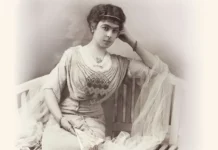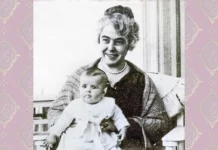Dona Lucilia, with seriousness and firmness, rejected the so-called “modern” mentality, whose final and bitter fruits we still taste today. In her view, accepting it would mean abandoning the path of duty.
With the end of the war in 1918, a period that would be dubbed by historians as Entre deux Guerres1 began. The harmonic chords of the waltz were replaced by the strident and cacophonous sounds of jazz. The staid and solemn horse-drawn carriage gave way, once and for all, to the automobile, setting a new pace to life. Women – until then the queen of the home, took their first steps toward gender equality. In one stride, hemlines rose from the ankles to the knees, and the long and beautiful dresses of yesteryear were discarded. A march was set in motion whose endpoint – and everyone sensed it – was immodesty.
Women who had customarily worn their long hair like a crown honouring their dignity sacrificed it on the altar of fashion and pragmatism. The new style was called à la garçonne.2 Rouge and bâton, which no self-respecting woman used before, gradually overruled modest customs. Laughter, which formerly played a discreet role in life, became the vital symbol of happiness – an idea widely spread by Hollywood films. The non-joker and those lacking the pseudo-charisma of stimulating constant hilarity were put aside at social events.
An unchecked grab for money went part and parcel with this new way of being. God, morals, thought, tradition, refinement, good taste and manners were labelled as myths belonging to the past; what mattered was the “good” life in the present.

Dona Lucilia – courteous and affable, while always serious and firm – rejected this so-called “modern” mentality, whose final and bitter fruits we still taste today. In her view, accepting it would mean abandoning the path of duty.
For her, religion was not limited to keeping the sacred precepts of the Law of God and practicing devotions with no connection to the good of the temporal order. Religion included, beyond this, a vision of life in accordance with the revelations and dictates of the Sacred Heart of Jesus, which should encompass all aspects of human activity. She took care to orient her everyday activities according to this vision, from household duties, to the children’s upbringing, and even to her social life.
A small but touching episode clearly illustrates her resistance to the “modern” spirit.
Dona Lucilia refuses to follow the new fashion
At a luncheon one day, friends and relatives started goading Dona Lucilia to cut her hair à la garçonne and to use make-up, since she was the only one in their social circle that had not adopted the new style. Perhaps her quiet but unshakable faithfulness to the old customs caused a degree of moral friction with those around her.
Dona Lucilia deftly side-stepped the issue as long as she could to avoid unpleasantries with the visitors, but the conversation went on and the irksome persistence continued. When the pressure rose well above tolerable levels in what was a personal matter, she reacted, as she frequently did, with an expressive silence.
Plinio, who was then around twelve years old, was seated beside her. While he was naturally communicative and assertive, he listened quietly to this exchange, since children were not permitted to speak at the table. He, who had always been enchanted with his mother’s appearance and noted how well her exterior suited the noble interior of her soul, saw her fall silent. Then and there, he decided to intervene to support her good position. Pushing his chair back, he went down on his knees before Dona Lucilia, affectionately imploring:
“Mamãe, will you promise me that as long as you live you will never cut your hair or use bâton?”
Touched by her son’s gesture, she turned to the others with an almost playful smile and gently and affably closed the discussion:
“You see? Plinio does not want me to cut my hair, so I will not cut it…”
Silence settled over the room. Never again did relatives or friends raise the subject, for the rest of Dona Lucilia’s days.

When her children saw her for the last time lying in the coffin, her venerable silver hair was untouched, and her lips, forever closed, were devoid of lipstick. Even in death she was faithful to the request that her son had so earnestly made to her on his knees when still a boy.
Streetcars serve as a pretext for shortening dresses
Dona Lucilia noted the first sign of moral decadence with regard to feminine attire following closely upon the generalized use of electric streetcars as the main means of urban transportation.
She had witnessed the inauguration of the first tram-line in São Paulo in 1900. Years later, she described to her children how the public euphoria at being able to ride in vehicles powered by electricity – with free passes, moreover, on the first day – was so great that some people even rode on top of the cars.
This euphoria triggered an important and grave change in women’s fashions. Dona Lucilia explained that ladies’ ankle-length dresses could hamper their exit from the streetcars, causing them to trip on the steps. For this and other reasons, dresses became shorter over the years until they reached the knees. Dona Lucilia saw each shortening as a danger signal.
The “cattle stampede”
Who can stroll through the Coliseum in Rome without being taken by a feeling of respect and veneration for the thousands of martyrs who were devoured there by beasts for refusing to burn incense to idols?
If subtler, no less admirable is the heroism of one who resolves to uphold all the principles taught by the Holy Church in a society that has turned its back to the truth and the good. Millions of people, dreading the thought of being rejected by those around them, capitulate under this pressure and spiritually perish.

When she came up against Hollywood’s overbearing influence, Dona Lucilia remained serenely opposed to everything that clashed with her Catholic convictions.
Years later she would relate – discreetly but with total disapproval – a scandal that surfaced in São Paulo at this time, involving two families in the social limelight for their affluence.
A certain man left his wife and went to live with a woman who had abandoned her husband, and the two took up a lifestyle of double adultery. To confer an appearance of legitimacy to their corrupt conduct, they travelled to Uruguay and returned saying that they had contracted a civil marriage there. Friends and acquaintances heard the woman claim that their union was really a “marriage,” which amounted to equating concubinage with matrimony. With an expression revealing her censure of this statement, Dona Lucilia added that those days still bore traces of morality, which explains why this situation met with general disapproval.
The story continued. One day, a relative of Dona Lucilia’s was shopping at Casa Mappin – a store which carried only the finest merchandise, making it a favourite among high society – when she witnessed a shocking scene. Hearing a sudden commotion, she turned around and saw two women physically attacking each other with blows and kicks, and she realized that it was the legitimate wife and the above-mentioned concubine.
Since she was known to both parties, she hastily left the shop, to avoid becoming involved in the shameful brawl. At lunch at the Ribeiro dos Santos’ house that day, she gave an account of what she had seen, sparking a barrage of commentary at the table. Dona Lucilia listened to everything in silence. However, when it was remarked that concubinage was unacceptable but that wives should be more tolerant of their husbands’ misconduct, Dona Lucilia sighed deeply and said:
“Tolerance, tolerance! I wouldn’t count on much of it… Men have carried their deceit to the point where their wives can no longer abide it. And now, besides their husbands’ deplorable conduct, immoral movies and literature are making them just as bad. This episode shows that the cattle stampede is just beginning…”
This pithy observation – an astute prediction – was met by laughter by some, not because they thought what she said was ridiculous but because they found the expression “cattle stampede” comical. They failed to grasp the thought in its depth, but future decades would confirm it. Today, divorce is widespread, as is concubinage; in truth, the “cattle” have stampeded.
Unpretentiousness, serenity, and perfection
Utterly self-assured, Dona Lucilia rose above the frenzy, anxiety and competitive spirit of her time, unlike most women and girls who fell under the influence of the Hollywood spirit.
The vestiges of pomp in social life, however, still demanded elegant formal attire at balls, usually inspired by French fashions. Upper-class ladies subscribed to Parisian magazines with illustrations of the latest and finest in feminine attire. What colour should the silk of a gown be to set off a certain coiffure? What was the best combination of hat, shoes, and purse? What jewels were most appropriate for a given dress? Everything was meticulously weighed, considered and discussed, with an eye to the next social event.
Many women had their wardrobes furnished at a large specialty store, La Saison, beautifully decorated according to French taste. The proprietor, Madame Françoise – according to the Brazilian rendering, Dona Francisquinha – or her assistants usually went to the client’s homes, for fabric selection, measuring and fitting sessions.

Dona Lucilia followed this social norm like the others, designing her dresses, selecting fabrics and overseeing her dressmakers’ work. She also took lively part in the conversations about such things, while never yielding to the agitation that this topic tended to elicit.
On the day of a party, most ladies waited with bated breath for the event to begin. Dona Lucilia had prepared herself as impeccably as they. Sure of her good taste, but with utter unpretentiousness, she maintained her customary poise and serenity.
She was a bastion of traditional Paulista composure, in a world that was succumbing to the turmoil of modern life.
Fidelity, even at the price of isolation
Dona Lucilia’s admirable consistency exacted the heavy toll of isolation which she bore with the firm resignation of a Catholic soul.
As the new mentality gained ground, those who were faithful to the traditions and manners of the past were gradually set aside, sentenced to the harsh penalty of ostracism. Their conversation, once viewed as enjoyable, was now thought uninteresting. Their ceremonious bearing was at odds with the modern way; only the funny, the exciting, and the spontaneous had a right to exist.
It was when the winds of change were at their strongest that Dona Lucilia saw her children reach adolescence – that pivotal phase in a person’s life in which all can be gained or lost. Rosée, now twelve, still had the advantage of being educated at home. But as for Plinio, the day was inevitably approaching when he would have to attend school. Buttressed by a privileged formation, he must now wage the battle against human respect. Heavenly aid would not be lacking, nor would the fervent prayers of his mother.
But how many apprehensions assailed Dona Lucilia’s heart! ◊
Taken, with slight adaptations, from:
Dona Lucilia. Città del Vaticano-Nobleton: LEV;
Heralds of the Gospel, 2013, p.226-231
In the featured photo: Dona Lucilia a month before her death, at ninety-one years of age
Notes
1 The period between the First and the Second World Wars.
2 French expression that equates to “In a boyish style”.







